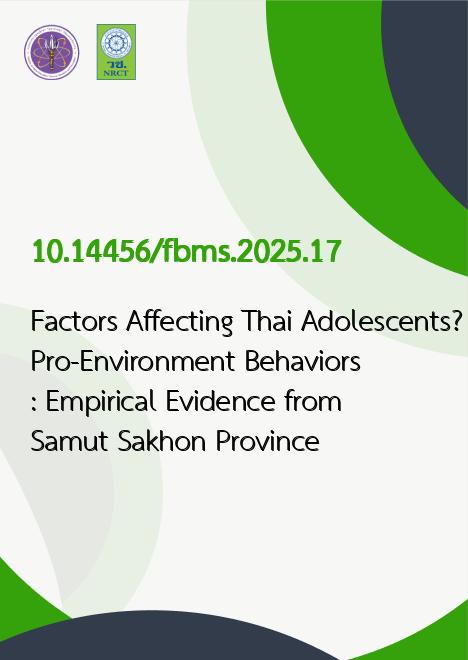
|
Factors Affecting Thai Adolescents? Pro-Environment Behaviors: Empirical Evidence from Samut Sakhon Province |
|---|---|
| รหัสดีโอไอ | |
| Creator | Pitsamorn Kilenthong |
| Title | Factors Affecting Thai Adolescents? Pro-Environment Behaviors: Empirical Evidence from Samut Sakhon Province |
| Publisher | University of the Thai Chamber of Commerce |
| Publication Year | 2568 |
| Journal Title | Journal of Family Business and Management Studies |
| Journal Vol. | 17 |
| Journal No. | 2 |
| Page no. | 123-144 |
| Keyword | Pro-environmental behavior, Environmental attitudes, Environmental concerns, Environmental knowledge, Thai Adolescents, Parents |
| URL Website | www.fbmsjournal.com |
| Website title | fbmsjournal |
| ISSN | 2821-9643(online) |
| Abstract | Children and young consumers are crucial market segments for sustainable marketing efforts. To encourage sustainable behaviors in children and young consumers, researchers, marketing managers, and policymakers need to understand the current state of their behaviors and the factors affecting them. With more than fourteen million children and adolescents in Thailand, this study aims to explore the pro-environmental behaviors of Thai adolescents and examine how demographic, psychological, and social factors affect their behaviors. The pro-environmental behaviors examined in this study comprise two dimensions, including resource conservation and recycling behaviors. This study hypothesizes that adolescents with higher levels of environmental concern, beliefs, and knowledge will display more pro-environmental behaviors. The adolescents? pro-environmental behaviors are also expected to be influenced by their age, gender, and parents? behaviors. Quantitative data analysis was conducted on a sample of ninth graders in Samut Sakhon province, and structural equation modeling was performed to test the proposed hypotheses. Results show that the adolescents' pro-environmental behaviors are directly and positively affected by their environmental concerns, beliefs, and parents' pro-environmental behaviors. Girls and older adolescents were found to display more pro-environmental behaviors than boys and younger adolescents. This study contributes to the literature by exploring Thai adolescents? pro-environmental behaviors and testing the relationships between these behaviors and several antecedents. The findings provide implications for researchers, marketing practitioners, and policymakers. |